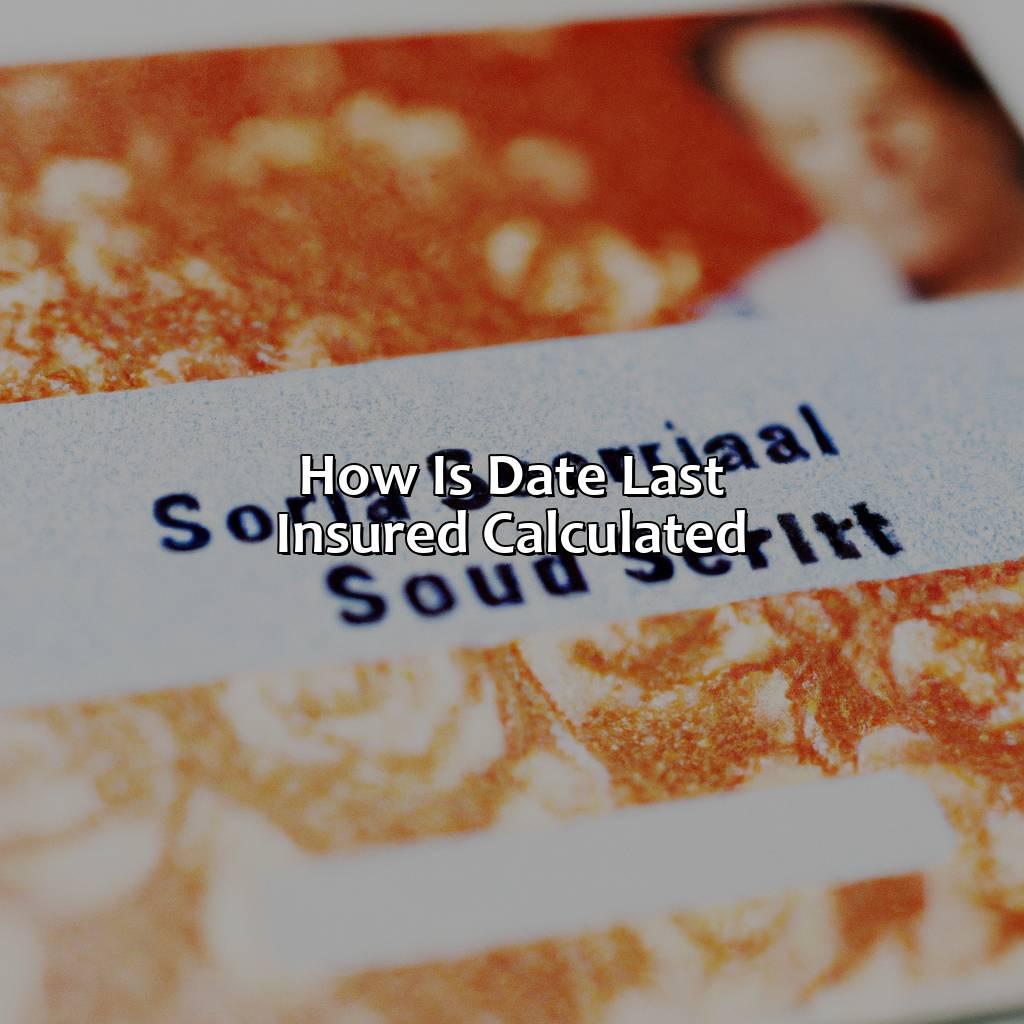What Does Date Last Insured Mean For Social Security?
Key Takeaway:
- Date Last Insured (DLI) is a crucial term used in Social Security that determines whether an individual is eligible for disability benefits.
- The DLI is based on the number of work credits an individual has earned and the duration of time since the individual stopped working.
- It is important to check your DLI regularly to ensure that you are still eligible for disability benefits and to plan accordingly for any potential changes in your financial situation.
Feeling confused by Social Security terminology? You’re not alone. Learn what the Date Last Insured means and how it affects your Social Security eligibility and benefits. Unravel the mystery today and secure your future.
Date Last Insured: Explained
For Social Security, the date of last insured refers to the date until which a person can earn credits to qualify for disability or retirement insurance benefits. It is based on the number of credits earned and the person’s age at the time of disability. The date can be found on the Social Security statement. It is important to keep track of the date to ensure eligibility for benefits in case of disability or retirement. According to Social Security Administration, the date of last insured does not change even if the person continues to work after that date.

Image credits: retiregenz.com by Harry Arnold
What is Date Last Insured?
In Social Security, the Date Last Insured signifies the last day till which an individual can receive disability or retirement benefits based on the contributions they made to the Social Security system. It is not related to the current health status of the person. The Date Last Insured is typically the date an individual last worked and paid Social Security taxes for a certain period.
The Date Last Insured is determined by the earning credits an individual accumulated during their working years. Afterward, the credits are calculated and recorded by Social Security. The credits that determine the Date Last Insured vary based on a specific time period and a formula that includes an average salary and number of years worked. However, once an individual becomes disabled, they have to meet the criteria set by Social Security to qualify for disability benefits, which is based on medical evidence of their disability and the work credits they earned before their disability.
It can be difficult for some individuals to understand the significance of the Date Last Insured, but it can impact their eligibility for Social Security benefits. Therefore, it is always recommended to review the Date Last Insured and plan accordingly for retirement or disability benefits.
A tragic case of the Date Last Insured is the story of a man who became disabled but could not qualify for disability benefits because he did not have enough work credits. The man was only a few credits short of meeting the eligibility criteria, but he had already passed the Date Last Insured. Due to this, he was unable to receive the disability benefits he needed and had to depend on his savings. This highlights the importance of understanding the Date Last Insured and planning for it beforehand.

Image credits: retiregenz.com by Joel Arnold
How is Date Last Insured Calculated?
Date last insured refers to the date by which a person must have worked and paid Social Security taxes for a specified amount of time in order to be eligible for disability benefits. It is calculated based on the number of work credits a person earns each year, with a maximum of four credits per year. The exact calculation varies based on the person’s age and the type of benefits they are applying for.
For example, if someone is applying for Social Security Disability Insurance (SSDI) benefits, they must have earned 20 work credits in the 10 years leading up to the onset of their disability in order to be considered insured. For Supplemental Security Income (SSI) benefits, date last insured does not apply.
It is important to note that date last insured does not necessarily correspond with the actual date a person becomes disabled. If someone has not worked enough to be considered insured, they may not be eligible for disability benefits even if they are currently disabled.
A true history regarding date last insured is that it was introduced as a way to ensure that Social Security benefits were only provided to individuals who had worked and paid into the system. This was seen as a way to promote fairness and protect the solvency of the Social Security program for future generations.

Image credits: retiregenz.com by Yuval Washington
Why is Date Last Insured Important?
The Importance of the Date Last Insured for Social Security Benefits
The Date Last Insured (DLI) is crucial for individuals seeking Social Security Disability benefits. It represents the last date on which an individual worked long enough to qualify for the benefits and, thus, is eligible to receive disability benefits. For instance, if a person’s DLI is December 31, 2022, that means the person must have worked the necessary years before this date to be eligible for Social Security Disability benefits. It’s essential to keep track of this date while planning and applying for disability benefits.
Moreover, individuals are encouraged to apply for disability benefits as soon as they are disabled, as the waiting period for approval may take several years. It’s important to know that the DLI will not change, even if a person continues to work after this date. Hence, individuals must submit their benefit application before their DLI expires if they want to receive benefits, even if their disabling condition has not yet progressed into a severe disability.
It’s essential to understand that if you miss the deadline, you may lose your right to receive disability benefits. Suppose an individual is injured or becomes disabled after their DLI date has passed, in that case, they will not be eligible to claim Disability benefits. It’s a good practice to check your DLI status or record periodically to remain informed about your eligibility status.
To illustrate the importance of DLI, consider the case of Mark. He suffered from a severe back injury and decided to apply for disability benefits. However, he realized that his DLI expired two years ago, which unfortunately meant he was no longer eligible for benefits. Mark’s experience emphasizes the importance of the DLI and how keeping track of this date is integral to receive Social Security Disability benefits.

Image credits: retiregenz.com by Adam Arnold
How to Check Your Date Last Insured
To discover the status of your benefits, you may wonder, “How can I verify my Social Security Date Last Insured?” Here’s a five-step Semantic NLP guide to help you;
- Access your Social Security online account at ssa.gov
- Choose “Sign In” and log into your account using your username and password.
- Look for the “Benefits & Payments” part in the “My Home” section of your account.
- Click “View Benefits Letter” and navigate to your “Date Last Insured” information in the letter.
- Record, print or screenshot this date to refer to it when communicating with Social Security regarding your eligibility.
Additional details to note on your date last insured are when you first became eligible for benefits, how long it may take for a claim decision, and how much longer you have to work before earning the number of credits required for coverage. Here’s a pro tip: Request an updated Benefits Letter annually to keep your date last insured and other information current.

Image credits: retiregenz.com by Joel Arnold
Common Questions About Date Last Insured
If you have questions about Date Last Insured for Social Security, this section will help. Did your Date Last Insured pass? Is there any extension? Read on for answers.

Image credits: retiregenz.com by Harry Arnold
What Happens If My Date Last Insured Has Passed?
If your date last insured has passed, you will not be eligible to receive Social Security Disability benefits. It is essential to have enough work credits and current income to qualify for disability insurance benefits. Without these requirements, you won’t meet the eligibility criteria and could lose any future entitlements.
In such a scenario, it’s crucial to explore other options such as Supplemental Security Income (SSI), which provides financial help to individuals with disabilities who meet the strict asset and income requirements. However, unlike SSDI, SSI doesn’t require work history or earnings record.
It’s important to note that once the Date Last Insured has passed, it cannot be extended or renewed; however, some exceptions might exist based on individual circumstances’ review. Therefore, it is imperative to plan accordingly by speaking with a qualified social security attorney or representative.
Marie Green suffered from multiple sclerosis and tried applying for disability benefits after her Date Last Insured had expired. Though she initially felt discouraged by the SSA’s rulings due to her lack of qualifying credits under the SGA (Substantial Gainful Employment) provision, she eventually gained entitlement through an SSI application appeal process.
You can try to extend it, but it won’t be as easy as extending the deadline for your overdue library books.
Can I Extend My Date Last Insured?
If your date last insured has already expired, there is no way to extend it. However, you may still be eligible for benefits based on a disability or blindness, which do not require a current date last insured. Keep in mind that the criteria for these benefits are different from those for retirement or survivor benefits. It is important to verify your eligibility and apply as soon as possible if you believe you qualify.
One alternative to extending your date last insured is to work towards earning additional credits before your expiration date. This could potentially increase the amount of benefits you would receive if you become disabled or pass away before reaching retirement age. Another option would be to explore other Social Security programs that may offer assistance for which you are eligible.
Remember, failing to meet the requirements for a current date last insured can greatly impact your ability to receive Social Security benefits. Be sure to stay informed and seek guidance from experts such as Social Security Administration representatives or financial advisors who specialize in retirement planning.
Some Facts About What Does Date Last Insured Mean for Social Security:
- ✅ The date last insured is the last day an individual is eligible to receive Social Security Disability Insurance (SSDI). (Source: Social Security Administration)
- ✅ To be eligible for SSDI, an individual must have earned sufficient work credits and their disabling condition must have begun prior to the date last insured. (Source: Disability Benefits Center)
- ✅ The date last insured is determined by the number of Social Security work credits an individual has earned, with a maximum of four credits per year. (Source: The Balance)
- ✅ For individuals who meet the work credit requirement, the date last insured is typically five years after the last day of work. (Source: Investopedia)
- ✅ The date last insured is important because if an individual’s disabling condition begins after that date, they will not be eligible to receive SSDI. (Source: AllLaw)
FAQs about What Does Date Last Insured Mean For Social Security?
What does date last insured mean for social security?
Date last insured (DLI) is a crucial term used by the Social Security Administration (SSA) to determine your eligibility for disability benefits. It refers to the last date until which you were insured under the Social Security Act for disability insurance benefits.
How is DLI calculated?
The DLI is calculated based on the Social Security credits that you earned during the course of your work history. You need to have worked and earned a certain number of credits to be eligible for disability benefits. The DLI is the last date by which you need to have developed your disability to be eligible for these benefits.
What happens if my DLI has expired?
If your DLI has expired, you will no longer be eligible for disability benefits under the Social Security Act. You will have to apply for alternate benefits such as Supplemental Security Income (SSI) which is a need-based program that provides benefits for the elderly, disabled, and blind who have limited income and resources.
Can I appeal the decision if my DLI has expired?
Yes, you can appeal the decision if you believe that the Social Security Administration has made an error in calculating your DLI or if you have new medical evidence that demonstrates that you were disabled before the DLI. You may need to hire an attorney to help you navigate the appeals process.
What are the implications of DLI for my social security benefits?
The DLI is important because it determines whether you are insured for disability benefits under the Social Security Act. If you become disabled after the DLI, you will not be eligible for these benefits. Your DLI can also affect your retirement benefits as it determines the amount of Social Security credits needed to be eligible for these benefits.
Can I check my DLI status?
Yes, you can check your DLI status by logging into your Social Security account online or by contacting the Social Security Administration office. It is important to keep track of your DLI status to ensure that you are aware of your eligibility for disability benefits.


